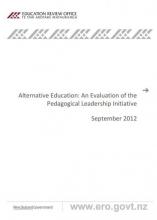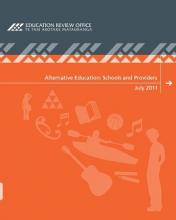- Topics: Alternative education (AE), Assessment, Much more than words: Manuka takoto kawea ake, Pacific student achievement, Tātaiako, Writing
- Published: 11 Jun 2019
Keeping children engaged and achieving in writing
This report shares some of the strategies and approaches used by schools who had focused on improving achievement in writing. It also shares some simple strategies used in classrooms where achievement in writing had been accelerated.
- Published: 25 Sep 2018
Provision for Students in Activity Centres
There are 14 activity centres in New Zealand that cater for secondary school students (Years 9 ‑ 13) who are at risk of disengaging from mainstream schooling and at risk of low educational, social and vocational outcomes. Activity centres are established by agreement of the Minister of Education. Priority is given to those students whose behaviour is likely to impede their own learning and the learning of others, and who are most likely to benefit from the programme.
- Published: 28 May 2018
Case studies - Aotea College Case Study: Improving Māori student wellbeing and achievement
Improvement in Action brings to life ERO’s School Evaluation Indicators and illustrates what works to achieve successful outcomes for all children and young people in the education system.
The case studies complement the video sequences in Improvement in Action.
- Published: 24 Apr 2018
Evaluation at a glance: A decade of assessment in New Zealand Primary Schools - Practice and trends
High quality assessment and evaluation allows us to focus on student progress and outcomes at classroom, school and system levels. It helps teachers, schools and systems to report on student achievement across points in time, and provide information for parents, trustees and the public about the quality of education.
- Published: 09 Feb 2017
Extending their language - expanding their world: Children’s oral language (birth-8 years)
Research evidence shows early in a child’s life is a critical time in terms of the rapid language development that takes place, particularly in the first two to three years.
This evaluation investigated how effectively young children’s oral language learning and development were supported in their early years of education.
- Published: 14 Mar 2014
Your child's education
These booklets have been written for everyone who parents a child - those who have care and responsibility for children attending a school. The booklets include questions you can ask, as well as general information that you may find useful. Click on the booklet to read and download.
Your child's education is an overview of education in New Zealand, from early childhood education through to secondary school. The information and questions are a useful insight into what education looks like in New Zealand and the opportunities available to your child.
- Published: 01 Nov 2013
Making Connections for Pacific Learners' Success
This report discusses secondary schools where Pacific learners are achieving at or above the national norms for all students. It includes details of initiatives and good practice and how these work together to get great results.
- Published: 01 Jun 2013
Provision for Students in Activity Centres
This national report presents the findings of ERO’s recent evaluation of the 14 Activity Centres in New Zealand providing alternative schooling for secondary students likely to benefit from a specialist programme.
- Published: 02 Oct 2012
Alternative Education: An Evaluation of the Pedagogical Leadership Initiative
In 2011 the Ministry of Education introduced funding for pedagogical leadership in alternative education to improve the quality of teaching and learning. This evaluation examined the impact of that funding initiative by looking at the work of 10 clusters providing alternative education. It also identified a set of principles to provide guidance on good practice.
- Published: 01 May 2012
Improving Education Outcomes for Pacific Learners
This is ERO's third report on the progress of schools in promoting Pacific student achievement. It tells a similar story to ERO's two previous reports with little evidence of system-wide improvement.
- Published: 01 Nov 2011
Literacy in Early Childhood Services: Good Practice
The intent of the evaluation was to gain an insight and understanding of literacy teaching and learning in early childhood education. This report complements the ERO national evaluation report, Literacy in Early Childhood: Teaching and Learning, February 2011. It presents examples of good practice from 13 early childhood services, identified during their ERO reviews, which had high quality literacy teaching and learning. ERO revisited these services in Term 4, 2010. These services were at different stages in their understanding and associated literacy teaching and learning practices.
- Published: 30 May 2011
Alternative Education: Schools and Providers
Includes two reports: Secondary Schools and Alternative Education and Good Practice in Alternative Education
- Published: 06 Apr 2011
Working with the National Standards: Raising student achievement in reading, writing and mathematics
This is the latest report in the series of ERO's national evaluation reports about the implementation of the National Standards in English-medium schools with students in Years 1 to 8.The evaluation involved 237 schools reviewed by ERO in Terms 3 and 4, 2010. The report indicates that schools are still at varying stages of working with the National Standards.
- Published: 02 Dec 2009
Reading and Writing in Years 1 and 2
This Education Review Office (ERO) evaluation focused on how effectively reading and writing was taught in the first two years of schooling, and on how well teachers used assessment information to plan and evaluate their teaching.
- Published: 01 Nov 2007
The Quality of Assessment in Early Childhood Education
Assessment informs an early childhood service’s programme and educators’ teaching practices. ERO evaluated the quality of assessment in all the early childhood services reviewed in Terms 3 and 4, 2006.
Services were at varying stages in their understanding and implementation of assessment practices, as not all had yet participated in professional development.
- Published: 01 Jun 2007
The Collection and Use of Assessment Information: Good Practice in Secondary Schools
ERO evaluated the collection and use of assessment information in schools in 2006. The evaluation concluded that more work can be done to improve assessment practice in schools. This complementary report aims to help secondary schools review their assessment practice. It highlights characteristics common to high quality assessment practices and includes examples of good practice.
- Published: 01 Jun 2007
The Collection and Use of Assessment Information: Good Practice in Primary Schools
ERO evaluated the collection and use of assessment information in schools in 2006. The evaluation concluded that more work can be done to improve assessment practice in schools. This report builds on this finding by giving examples of good practice in the collection and use of assessment information in primary schools. The report also includes three detailed case studies.
- Published: 01 Mar 2007
The Collection and Use of Assessment Information in Schools
Knowing what students know and can do is fundamental to effective teaching and students’ learning. Teachers need to assess student achievement to know whether or not their teaching is meeting the learning needs of their students.
In 2006, ERO evaluated how effectively schools collected and used assessment information. This report details the findings of that evaluation and recommends what can be done to make assessment practices in schools more effective.

















